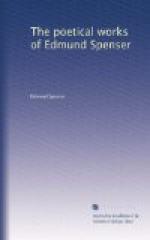So we that live, and ages that succeed,
With great applause thy learned works
shall reed.
* * * * *
Ah! Colin, whether on the lowly plaine,
Piping to shepheards thy sweet roundelayes,
Or whether singing, in some loftie vaine,
Heroicke deeds of past or present dayes,
Or whether in thy lovely mistresse praise
Thou list to exercise thy learned quill,
Thy Muse hath got such grace and power to please,
With rare invention, beautified by skill,
As who therin can ever ioy their fill!
O, therefore let that happy Muse proceed
To clime the height of Vertues sacred hill,
Where endlesse honour shal be made thy meed:
Because no malice of succeeding dales
Can rase those records of thy lasting
praise.
G. W. I[unior].
* * * * *
AMORETTI.[*]
[* These Sonnets furnish us with a circumstantial and very interesting history of Spenser’s second courtship, which, after many repulses, was successfully terminated by the marriage celebrated in the Epithalamion. As these poems were entered in the Stationers’ Registers on the 19th of November, 1594, we may infer that they cover a period of time extending from the end of 1592 to the summer of 1594. It is possible, however, that these last dates may be a year too late, and that Spenser was married in 1593. We cannot be sure of the year, but we know, from the 266th verse of the Epithalamion, that the day was the feast of St. Barnabas, June 11 of the Old Style. In the 74th sonnet we are directly told that the lady’s name was Elizabeth. In the 61st, she is said to be of the “Brood of Angels, heavenly born.” From this and many similar expressions, interpreted by the laws of Anagram, and taken in conjunction with various circumstances which do not require to be stated here, it may be inferred that her surname was Nagle. C.]
* * * * *
I.
Happy, ye leaves! when as those lilly hands
Which hold my life in their dead-doing might
Shall handle you, and hold in loves soft bands,
Lyke captives trembling at the victors sight.
And happy lines! on which, with starry light.
Those lamping eyes will deigne sometimes to look,
And reade the sorrowes of my dying spright,
And happy rymes! bath’d in the sacred brooke
Of Helicon, whence she derived is.
When ye behold that Angels blessed looke,
My soules long-lacked food, my heavens blis,
Leaves, lines, and rymes, seeke her to
please alone,
Whom if ye please, I care for other none!




